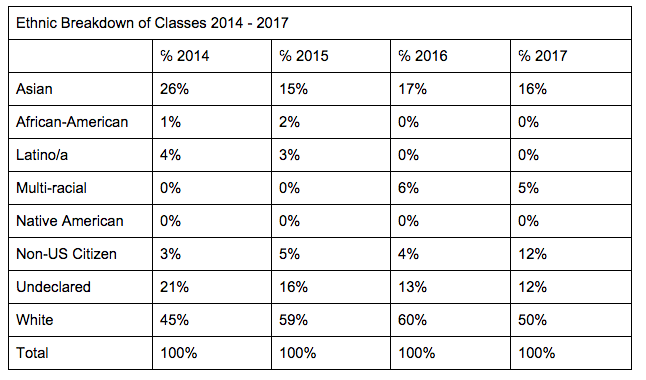LA’s South Bay will always be my stomping ground. The predictable sunniness is more than heartwarming, and I have a soft spot for the grittiness of urban living. But, my favorite is the amount of cultural cross-pollination that naturally results from being one of the most ethnically and socioeconomically diverse counties in America.
But as much as I love Olin and as much as I have grown here, I can’t help but think that last piece is what’s missing.
I don’t have an overwhelmingly huge problem with Olin’s racial diversity deficit. Administration is making an effort. This past August, Provost Vin Manno signed a White House/American Society of Engineering Education pledge committing to increasing campus diversity and inclusiveness. Admissions Dean Emily Roper-Doten is working on, to quote her recent email, “creating an admissions process that is equitable and supports students of all backgrounds, especially those from low-income families or those traditionally underrepresented in college.”
No. What I find more troubling is the reluctance to learn from those fundamentally different from ourselves – outside of a small group of friends. We have no problem sharing the whacky, off-the-wall we do inside and outside class. I’m always impressed! But, I want to get to know my peers as whole people, not just as engineers-in-training.
Changing the school’s numbers on paper means nothing if we students don’t know how to identify and embrace each others’ uniqueness. I’m talking about here and now, not the fuzzy, distant future when administration’s plans have been defined and executed. We Oliners value harmony, and naturally so. It’s a tiny community. By refraining from recognizing differences and sticking to safe topics, we reduce the risk of offending our friends, neighbors, peers.
The result is a clean, neutral space. But where is the vibrancy in that?
If we fail to acknowledge the impact that any axis of diversity – ethnicity, gender, socioeconomic status, religion, whatever – has on a person’s background and experiences, we are invalidating chunks of identity. If we avoid our peers’ differences instead of embracing them, then we are silencing what makes each individual unique. If I want to be a thoughtful human being, let alone an effective designer and engineer, I can’t afford to ignore the dimensionalities of a person. I can’t even abstain, because every conversation I abstain from means that I am losing knowledge and insight.
I don’t have any formula or magic bullet. But I believe that if we can discard our discomfort, we can navigate this space together.
Ethnic Breakdown of Classes 2014 – 2017

For anyone that’s curious, this is what the student body looked like when I was a freshman. Data from former Dean of Admissions Charlie Nolan, compiled Summer 2014. His breakdowns are percentages, which I understand might not be the best representation of a tiny student population. Quoting Charlie: “1) These are self-reported data as indicated on the Common App. 2) The Common App added “multiracial” for ℅ 2016. 3) There are likely more underrepresented students who are more than one race or ethnicity or, who list themselves as multi-racial or don’t declare a race or ethnicity.”